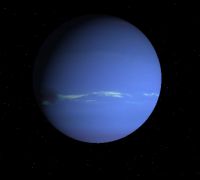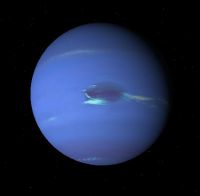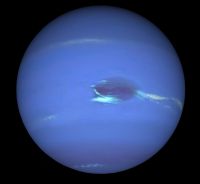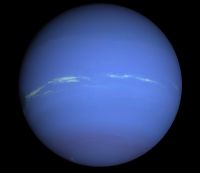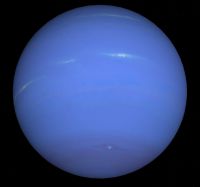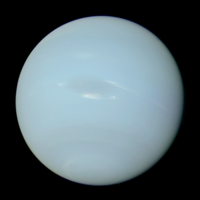Difference between revisions of "Neptune"
(Added table line item.) |
(Added content.) |
||
| (5 intermediate revisions by the same user not shown) | |||
| Line 2: | Line 2: | ||
!bgcolor="lightsteelblue" colspan="2" align="center" |Neptune | !bgcolor="lightsteelblue" colspan="2" align="center" |Neptune | ||
|- | |- | ||
| − | |colspan="2" align="center"|[[Image: | + | |colspan="2" align="center"|[[Image:Neptune-neptunezip.jpg|240px]] |
|- | |- | ||
|colspan="2" align="center"|'''Neptune in Orbiter''' | |colspan="2" align="center"|'''Neptune in Orbiter''' | ||
| Line 96: | Line 96: | ||
Neptune has been a part of the [[Orbiter]] family of bodies at least since the release of Orbiter 2001. In the 2001 version, Neptune had no moons, but 14 moons have been added in later releases of Orbiter or as a part of add-ons. | Neptune has been a part of the [[Orbiter]] family of bodies at least since the release of Orbiter 2001. In the 2001 version, Neptune had no moons, but 14 moons have been added in later releases of Orbiter or as a part of add-ons. | ||
| − | Orbiter | + | In Orbiter 2002, the orbital parameters were moved from ''Neptune.cfg'' to the module ''Vsop87.dll''. In ''neptune.zip'', Neptune's rings were added. |
| + | |||
| + | |||
{|class="wikitable sortable” style="text-align: center" | {|class="wikitable sortable” style="text-align: center" | ||
|- | |- | ||
| Line 102: | Line 104: | ||
|- | |- | ||
!Add-on!!Source!!Version!!Author!!Type!!Release Date!!Compatibility!!Wiki article | !Add-on!!Source!!Version!!Author!!Type!!Release Date!!Compatibility!!Wiki article | ||
| + | |- | ||
| + | |[https://www.orbiter-forum.com/resources/2005-with-p1-patch-files.5432/ 2005 (with P1 patch files)]||O-F Resources||050216||martins||Orbiter Download||16 February 2005||Orbiter 2005|| | ||
| + | |- | ||
| + | |[https://www.orbiter-forum.com/resources/orbiter-2003-p2.5433/ Orbiter 2003-P2]||O-F Resources||031217||martins||Orbiter Download||17 December 2003||Orbiter 2003-P2|| | ||
| + | |- | ||
| + | |[https://www.orbiter-forum.com/resources/orbiter-2003-p1.5434/ Orbiter 2003-P1]||O-F Resources||031105||martins||Orbiter Download||5 November 2003||Orbiter 2003-P1| | ||
| + | |- | ||
| + | |[https://library.avsim.net/esearch.php?DLID=&Name=&FileName=uranus-neptune_ii.zip&Author=&CatID=root Uranus-Neptune II]||AVSIM||||Rolf B Keibel||Scenery||6 March 2003|||| | ||
|- | |- | ||
|[https://library.avsim.net/esearch.php?DLID=&Name=&FileName=neptune.zip&Author=&CatID=root Neptune]||AVSIM||||Rolf Keibel||Scenery||7 November 2002|||| | |[https://library.avsim.net/esearch.php?DLID=&Name=&FileName=neptune.zip&Author=&CatID=root Neptune]||AVSIM||||Rolf Keibel||Scenery||7 November 2002|||| | ||
| Line 118: | Line 128: | ||
* [[Nereid]] | * [[Nereid]] | ||
| − | <gallery> | + | <gallery widths="200" heights="200"> |
NeptuneOrbiter2001.jpg|<center>Neptune in Orbiter 2001</center> | NeptuneOrbiter2001.jpg|<center>Neptune in Orbiter 2001</center> | ||
NeptuneOrbiter2002.jpg|<center>Neptune in Orbiter 2002</center> | NeptuneOrbiter2002.jpg|<center>Neptune in Orbiter 2002</center> | ||
| + | Neptune-neptunezip.jpg|<center>Neptune from ''neptune.zip'' in Orbiter 2002</center> | ||
| + | Neptune-orbiter2002p3.jpg|<center>Neptune in Orbiter 2002P3</center> | ||
| + | Neptune-Orbiter2003P2.jpg|<center>Neptune in Orbiter 2003P2</center> | ||
| + | Neptune-Orbiter2005P1.jpg|<center>Neptune in Orbiter 2005P1</center> | ||
Neptune Voyager2 color calibrated.png|<center>Neptune as seen by the [[w:Voyager 2|Voyager 2]] spacecraft on 17 August 1989<br>Wikimedia Commons</center> | Neptune Voyager2 color calibrated.png|<center>Neptune as seen by the [[w:Voyager 2|Voyager 2]] spacecraft on 17 August 1989<br>Wikimedia Commons</center> | ||
</gallery> | </gallery> | ||
Revision as of 03:15, 17 September 2024
Neptune is the 8th planet from the Sun, the fourth largest planet by size and the third by mass. Neptune was actually observed by Galileo Galilei on at least two occassions in 1612 and 1613, but did not realize that it was a planet, mistaking it for a star. In 1845, John Couch Adams and Urbain Le Verrier indpendently calculated that there should be another planet based upon perturbations of the orbit of Uranus. Le Verrier sent a letter with his findings to Johann Gottfried Galle who was then the first observer of Neptune and recognized it for what it is.
Neptune in Orbiter
Neptune has been a part of the Orbiter family of bodies at least since the release of Orbiter 2001. In the 2001 version, Neptune had no moons, but 14 moons have been added in later releases of Orbiter or as a part of add-ons.
In Orbiter 2002, the orbital parameters were moved from Neptune.cfg to the module Vsop87.dll. In neptune.zip, Neptune's rings were added.
| Add-on | Source | Version | Author | Type | Release Date | Compatibility | Wiki article |
|---|---|---|---|---|---|---|---|
| 2005 (with P1 patch files) | O-F Resources | 050216 | martins | Orbiter Download | 16 February 2005 | Orbiter 2005 | |
| Orbiter 2003-P2 | O-F Resources | 031217 | martins | Orbiter Download | 17 December 2003 | Orbiter 2003-P2 | |
| Orbiter 2003-P1 | O-F Resources | 031105 | martins | Orbiter Download | 5 November 2003 | ||
| Uranus-Neptune II | AVSIM | Rolf B Keibel | Scenery | 6 March 2003 | |||
| Neptune | AVSIM | Rolf Keibel | Scenery | 7 November 2002 | |||
| Orbiter 2002 | O-F Resources | 020419 | martins | Orbiter Download | 19 April 2002 | Orbiter 2002 | |
| Orbiter 2001 | O-F Resources | 010503 | martins | Orbiter Download | 3 May 2001 | Orbiter 2001 | |
See also
Natural satellites
Neptune as seen by the Voyager 2 spacecraft on 17 August 1989
Wikimedia Commons
| Neptune's natural satellites |
|---|
| Named satellites:
Despina | Galatea | Halimede | Hippocamp | Laomedeia | Larissa | Naiad | Nereid | Neso | Proteus | Psamathe | Sao | Thalassa | Triton Numbered Satellites: |
| See also: Pronunciation key | rings of Neptune |
| edit The Solar System | |
|---|---|
| Central star |
Sun (Sol) |
| Planets |
Mercury - Venus - Earth - Mars - Jupiter - Saturn - Uranus - Neptune |
| Natural satellites |
Moon - Phobos - Deimos - Io - Europa - Ganymede - Titan - more... |
| Add-ons |
Planets - Dwarf Planets - Small objects - Natural satellites - Alternative star systems |
 | This article, about a planet, is a stub. You can help Orbiterwiki by expanding it. |

